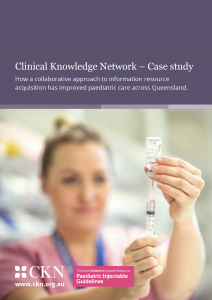Medication dosing and administration in children is very different compared to adults. Having reputable paediatric-specific resources readily available would help clinicians to have the right information at the right time, which ultimately improves patient outcomes. It’s unique compared to other references. It’s developed within Australia so the information and medications are more applicable to our local practice and assists us in making clinical decisions that are best suited for our cohort of patients. With the information available in the PIG, clinicians can make rational decisions for medications to be administered. The PIG has helped bridge the gap, moving paediatrics away from being therapeutic orphans.
How a collaborative approach to information resource acquisition has improved paediatric care across Queensland.
The PIG is a much-needed resource that the Clinical Knowledge Network (CKN) in Queensland acquired on advice from clinicians involved in neonatal medicine and nursing, and paediatric pharmacy. Through the experience of the CKN network, the PIG is accessible to all QLD Health services. Bruce Chio, an A/Pharmacist Consultant at the Queensland Children’s Hospital explains the benefits of utilising an Australian developed paediatric-specific resource within a hospital environment. “The PIG has helped bridge the gap, moving paediatrics away from being therapeutic orphans.”
A growing need for paediatric resources
The PIG is Australian and highly regarded within this country and overseas for being compiled by practising paediatric pharmacists. The PIG draws on the extensive experience and knowledge of professionals who actually work on the front line of paediatric pharmacy.


